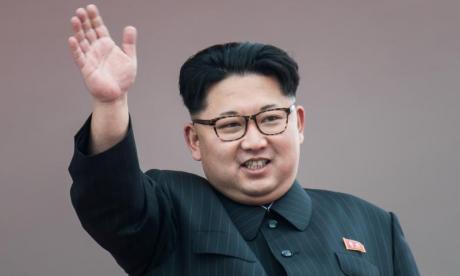Posted on November
23, 2019
Endless War Vs. Mindless Mantra
Will Trump throw in the towel?
by
Daniel
Clark
If you're tempted to feel any sympathy for President
Trump during the congressional impeachment hearings, remember first that he
once said it "would have been a wonderful thing" had George W. Bush been
impeached over the Iraq War.
 In
his eternal eagerness to make excuses for the world's worst villains, Trump
tells himself the liberal bedtime story that there were no weapons of mass destruction
in Iraq, and furthermore that Bush knew this, and lied about it to send us into
war. He's not interested in knowing
about the hundreds of chemical munitions that have been discovered in Iraq, the
extensive paper trail suggesting many times more, Saddam Hussein's clandestine
network of mobile chemical laboratories, an explanation from one of his officers
that he had modernized his WMD program so that he could produce smaller stocks
as he needed them, one of his secret recordings in which his son-in-law boasts
about how completely they'd fooled the weapons inspectors, the fact that he was
required to report his WMDs and destroy them under UN supervision in the first
place, and that WMDs were but one of many justifications for the invasion, as
enumerated in the declaration of war that was passed by Congress.
In
his eternal eagerness to make excuses for the world's worst villains, Trump
tells himself the liberal bedtime story that there were no weapons of mass destruction
in Iraq, and furthermore that Bush knew this, and lied about it to send us into
war. He's not interested in knowing
about the hundreds of chemical munitions that have been discovered in Iraq, the
extensive paper trail suggesting many times more, Saddam Hussein's clandestine
network of mobile chemical laboratories, an explanation from one of his officers
that he had modernized his WMD program so that he could produce smaller stocks
as he needed them, one of his secret recordings in which his son-in-law boasts
about how completely they'd fooled the weapons inspectors, the fact that he was
required to report his WMDs and destroy them under UN supervision in the first
place, and that WMDs were but one of many justifications for the invasion, as
enumerated in the declaration of war that was passed by Congress.
If Trump ever had that much substance to back up his
foreign policy, he would no doubt conclude that he'd made a perfect decision,
guided by his great and unmatched wisdom.
Mimicking the rhetoric for which Republicans had
rightly criticized President Obama, Trump has repeatedly promised to "end the
endless wars." No talk of success or
victory, just ending. He gave us a glimpse
of what this looks like when he announced the withdrawal of American forces
from Syria, in advance of Turkey's offensive against the Kurds. As a result, our closest allies in the fight
against ISIS have been brutalized and therefore no longer trust us; meanwhile
at least 800 captured ISIS members have been turned loose to resume their acts
of terror. But hey, the president only
said there would be an ending, not necessarily a happy one.
Upon announcing the killing of ISIS leader Abu Bakr
al-Baghdadi, the president acknowledged the role our Kurdish friends had played
in facilitating the raid. Not that this
gave him any second thoughts about his nearly simultaneous decision to betray
them. If anything, he probably figured
the enemy leader's death made it all more imperative to "end" the mission.
Not long ago, Trump attempted a more ambitious ending
than that. Seeking to end "America's
Longest War," he began negotiating with the Taliban for the removal of American
troops from Afghanistan. Of course, our
mission in that country had been to overthrow the Taliban, who were accessories
to the 9-11 attacks before and after the fact.
Any agreement that would allow that party to reassert control over that
nation would be tantamount to a surrender.
 As
if to emphasize the shamefulness of it, Trump actually planned the handover
through talks with Taliban leaders that were to take place at Camp David during
the week of 9-11. He only called off the
meetings after a deadly Taliban bombing in Afghanistan. Not that there was anything unusual about
that, except for the timing. Trump
understood that the Taliban were using violence as leverage against him in
negotiations. Had the attack not been a
personal affront to The Donald, it would not have interfered with his ending
that endless war.
As
if to emphasize the shamefulness of it, Trump actually planned the handover
through talks with Taliban leaders that were to take place at Camp David during
the week of 9-11. He only called off the
meetings after a deadly Taliban bombing in Afghanistan. Not that there was anything unusual about
that, except for the timing. Trump
understood that the Taliban were using violence as leverage against him in
negotiations. Had the attack not been a
personal affront to The Donald, it would not have interfered with his ending
that endless war.
In fact, talks are back underway, stoked by a prisoner
exchange in which three Taliban commanders were freed, including a leader of
the infamous Haqqani network, the militant wing of
the Taliban that had worked directly with Osama bin Laden. Just what does the president think the war is
all about, anyway?
Calling Afghanistan "America's Longest War" is a
misnomer, because that title rightly belongs to the Korean War, which is
ongoing, albeit under a cease fire since 1953.
Like the war in Afghanistan, the Korean War is one that our side is
winning, just as long as we don't succumb to the temptation to "end" it. Contrary to the prevailing opinion of
historians, Korea was not a stalemate.
The Communist aggressors failed to conquer South Korea at the time, and
are deterred from ever trying again by the presence of American soldiers on the
peninsula.
Trump has repeatedly stated his determination to bring
all those soldiers home. He is now
trying to concoct a pretext for such an action by demanding that the South
Koreans quadruple the amount they are paying for our continued presence in
their country. This has been a common
theme of Trump's foreign policy, that he portrays our allies as ungrateful
skinflints in order to justify siding with our enemies (as in the case of NATO
vs. Vladimir Putin).
The greatest among many problems with this is that our
foreign policy is our foreign
policy. Contrary to the semantic games
that were played at the time about a "police action," the United States was at
war with North Korea in the 50s, and still is.
Our personnel who are stationed in Korea are serving our own country. They are not mercenaries under orders from
Seoul.
As Trump deliberately provokes conflict with South
Korea, he praises Kim Jong-un's "great and beautiful vision" for North
Korea. It's astonishing that this even
needs to be asked of an American president, but would he really see anything
wrong with Kim imposing this vision on his neighbors to the South? If not, then why should the U.S. military
stand in the way?
Our greatest hopes for quelling the Norks' nuclear ambitions
are the suffocating sanctions against them, combined with the inability of that
unproductive Communist nation to financially sustain its own military. Those economic pressures will be assuaged for
the foreseeable future if Kim's government is allowed to overrun South Korea
and cannibalize its wealth. Does Trump,
who claims he can control Turkey's actions by threatening to destroy its
economy, really not understand this?
From one context to another, "ending the endless wars"
consistently means giving away our upperhand.
That this should be the defining foreign policy doctrine of a president
who ran on an "America first" platform, and promised to make America a winner,
begs for a level of scrutiny that is now being devoted to comparative
trivialities. Tragically, nobody seems
inclined to ask the questions. On one
side, the Democrats actually agree with Trump's defeatist policies. On the other, the Republican Party has become
so thoroughly consumed by Trump that it will not oppose him.
Trump is obviously not the eleventeen-dimensional
chess grand master his sycophants say he is, but he may have been thinking
several moves ahead when he announced his pullout from Syria. Perhaps that was only a trial run to gauge
public opinion, and the reactions of those within his own party, before he goes
ahead with his far greater abandonments.
If that's the case, it does not appear that he's been very effectively deterred.
The Shinbone: The
Frontier of the Free Press